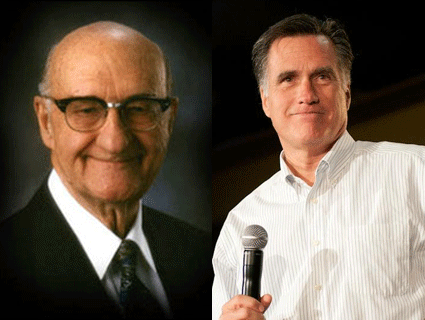
Mitt RomneyJeff Siner/Charlotte Observer/ZumaPress.com
Richard Grenell, Mitt Romney’s newly christened foreign policy spokesman, stepped down from the campaign on Tuesday. Grenell, who is gay, had come under fire from social conservative activists who viewed his hiring as a slap in the face. Although a Romney spokesman claimed the campaign had wanted Grenell to stay on, Romney staffers had already begun to shut him out before his resignation, counseling the gay foreign policy spokesman to stay silent during a recent campaign press call on foreign policy.
The episode is reminiscent of a controversy that occurred when Romney was governor of Massachusetts: The 2004 dismissal of Ardith Wieworka, longtime head of the state’s Office of Child Care Services, who alleged that she had been terminated because of her decision to marry her partner.
In May of that year, the same month same-sex marriage was legalized in the Bay State, the Northeastern University press office published a story announcing that Wieworka intended to marry her longtime partner, Carol Lyons, who worked at the school as the dean of career services.
The next month, Romney traveled to Washington, DC, to testify in support of a federal constitutional amendment to ban gay marriage. “Marriage is…a fundamental and universal social institution that bears a real and substantial relation to the public health, safety, morals, and general welfare of all the people of Massachusetts,” he told the Senate Judiciary Committee.
Two weeks later, the Boston Globe reported that Ronald Preston, Romney’s state health and human services commissioner, asked Wieworka to resign.
A veteran of three previous Republican administrations, Wieworka was at a loss about why she was fired. (She declined to comment for this story.) She told the Boston Globe later that month that, absent any clear motive, she suspected her ouster may have been a result of marriage:
Earlier this week, Wieworka strongly suggested that her firing was connected to her recent marriage to her lesbian partner. She said yesterday that she was not saying that was the reason, but that she wanted to raise the question in the absence of other credible explanations.
“When you accuse someone of something, you’ve reached a conclusion,” Wieworka said yesterday. “I want to look into the motivation.”
Wieworka noted that Preston’s explanation for the move changed considerably over time. He initially said it was due to restructuring, but later suggested that Wieworka had also been uncooperative. He never offered a clear, specific reason for the termination. Romney and Preston vehemently denied Wieworka’s firing had anything to do with her marriage, however. The governor told the Globe that Wieworka’s sexual orientation was something he only learned about after she had been fired. Preston called the idea that Wieworka was fired for her marriage “an outrageous allegation with no foundation whatsoever.” (Preston now teaches medicine at the University of Massachusetts Medical School.)
Whatever the explanation, the move was divisive. “[T]hose who have worked with Wieworka express shock and dismay at her departure,” Boston Magazine reported. The Boston Globe editorial board—making no mention of Wieworka’s charge of discrimination—panned the firing, writing “It is unfortunate that Preston could not work out a way to make use of Wieworka’s considerable experience and talent.”
In the eyes of Massachusetts’s LGBT community, the firing had a certain resonance. The state’s LGBT monthly, Bay Windows, noted the firing in a January 2012 piece detailing Romney’s record on gay issues as governor. Whether or not Wieworka’s marriage played a part in her termination, the timing of her departure was fitting: The episode came as Romney was in the midst of his political evolution from a gay-friendly, pro-choice moderate into someone culture warriors could believe in—an evolution, as Grenell’s resignation shows, that is far from finished.















